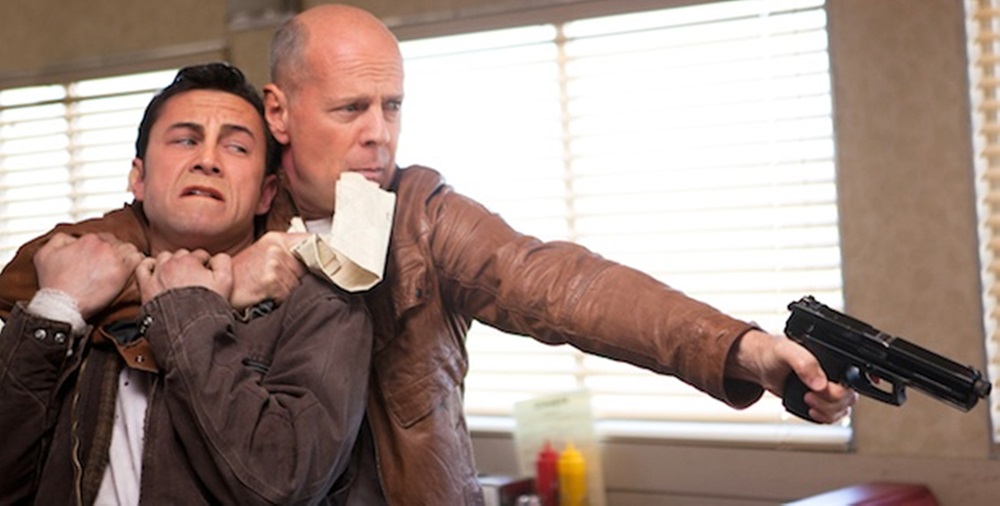
MPAA Rating: R | Rating: ★★★½
Release year: 2012
Genre: Action, Sci-Fi Director: Johnson
I love time-travel films. One of my all-time favorite movies is a little sci-fi flick called Primer. Made for less than $10,000, filmmaker Shane Carruth managed to make a time-travel story that has an impossibly complex narrative that somehow makes sense…I think. Maybe I should watch it again.
Carruth was brought in as a consultant for Rian Johnson’s latest film, Looper. Each of Johnson’s films (Brick, The Brother’s Bloom) have been ambitious and well-crafted narratives, filled with twists and turns. Looper is no exception as an intense sci-fi noir peppered with gripping action. The basic premise is fairly simple: Joe (Joseph Gordon-Levitt, wearing a layer of makeup) is a looper, a gunman used by an underworld syndicate that sends its enemies hurtling through time so the looper can take care of the dirty work. Pull the trigger, dispose of the body, take the money. When his elder self (Bruce Willis) gets sent back to “close the loop,” things begin to get complicated.
There hasn’t been an action film that has made me think this hard about its narrative since Christopher Nolan’s Inception. I mean that as a compliment. I liked Looper. Yet I admire it more than I embrace it.
The morality and motivation behind many of Joe’s decisions all gets loopy. Of course, time travel movies are never fully coherent or logical, but they should at least try. Explaining time travel is quickly dismissed by the elder Joe in a diner conversation with his younger self, arguing that he (and thus, we the audience) shouldn’t try too hard to look at the logic of it all. Yet as Looper invites us to try to understand the morality of time-travel, we should try to explain it. We need to understand the story of Joe, thus better understanding ourselves (and maybe this confusing film).
*Spoilers Follow*
The elder Joe is convinced that by killing the child version of the Rainmaker (the future crime lord who orders Joe’s execution), he may save both himself and his (future) wife. The younger Joe remains unconvinced and attempts to finish the job he’d been given–to close the loop and kill his older self. This ultimately leads the younger Joe to the home of a woman (Emily Blunt, in a convincing supporting role) and a young boy. This boy’s future hangs in the balance as the elder Joe believes him to be the Rainmaker. In a final confrontation, the younger Joe realizes that the elder Joe’s violent actions–the murder of the boy’s mother–would subsequently start the timeline that would lead to all the events to come. The boy becomes the Rainmaker because of the elder Joe’s actions, and the elder Joe is committing acts of violence because of the Rainmaker’s actions. (Yeah, it’s a loop. It doesn’t make sense to me either.) So Joe does the only thing he knows to do: he shoots himself in the chest, and the elder Joe disappears. Loop: closed.
Younger Joe’s decision at this climactic moment elicits a moral question:
What is the difference between self-sacrifice and suicide?
Motives? The people you’re dying for? The person “pulling the trigger?” Is there a difference between killing oneself and allowing oneself to be killed?
While I felt that the filmmakers were attempting to portray Joe’s final act as redemptive, I don’t believe the hero of Looper is much of a hero at all. He’s a criminal and a drug addict, self-isolated and willing to sell out his best friend for silver. This doesn’t mean that he doesn’t care about others, but he’s gunman: he solves his problems with a gun. When he is confronted with the elder version of himself, the older Joe has become a man willing to murder children in order to potentially save his wife in the future. I think the younger Joe realizes that this person–his future–is a monster. So when Joe chooses to shoot himself—rather than shoot the elder Joe, shoot himself in the hand, or cause another distraction to avoid the loop he envisions—is it an act of love? Does he do this because he genuinely loves the boy and the woman he has encountered? Or does he do this to stop the monster that he will become? Is it selfless or selfish, or both? Did he have any another choice?
Consider other films where the protagonist kills themselves (more spoilers): In Seven Pounds, a man wracked with guilt chooses to take his own life and offer his body (literally) to those who need his organs to live. This doesn’t feel like self-sacrifice to me. This isn’t noble or beautiful. This is a man who chooses to deal with his shame and guilt by attempting to atone for his sins through self-destruction. It’s suicide-for-others, but it is still suicide. On the other hand, sacrificial deaths in The Mission, To End All Wars, or even The Iron Giant, feel redemptive and heroic. They offer up their life for the sake of another. It’s one thing to take a bullet for someone; it’s another when your finger is the one pulling the trigger.
So here’s a theological question: would Jesus’s death on the cross be sacrificial and loving if he had nailed himself to the tree?
I doubt it. Perhaps we’ll find out in a kingdom beyond time.
IMDB Listing: http://www.imdb.com/title/tt1276104/